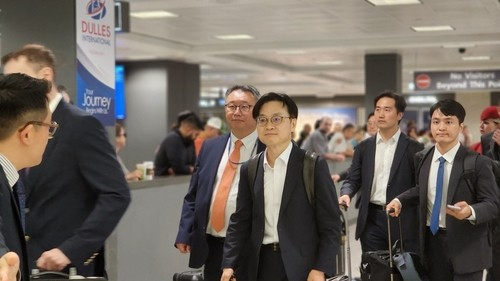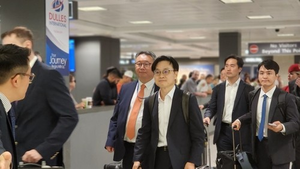 South Korea’s Industry Minister Kim Jung-kwan (center) arrives at Dulles International Airport near Washington on Friday. (Yonhap)
South Korea’s Industry Minister Kim Jung-kwan (center) arrives at Dulles International Airport near Washington on Friday. (Yonhap) WASHINGTON — South Korea’s Industry Minister Kim Jung-kwan pledged Friday to make “best efforts” to ensure the upcoming summit between Presidents Lee Jae Myung and Donald Trump will be successful, as he arrived in Washington for final pre-summit agenda coordination with his US counterparts.
Lee and Trump are set to have their first in-person meeting at the White House on Monday, with the agenda including bilateral trade and industrial cooperation.
“I came here to make preparations to ensure that the South Korea-US summit will proceed well,” he told reporters upon arrival at Dulles International Airport near Washington. “(We) will do our best to ensure (the summit) will be successful.”
His arrival in the US capital came less than a month after his last trip to the US, during which Trump announced a framework trade deal under which Washington agreed to lower “reciprocal” tariffs on Korea to 15 percent from the proposed 25 percent in return for South Korea’s investment commitments and other pledges.
In Washington, Kim plans to meet with Commerce Secretary Howard Lutnick and Energy Secretary Chris Wright, as Seoul and Washington are fleshing out last month’s trade deal in the lead-up to the summit.
Two days earlier, Trade Minister Yeo Han-koo arrived in the US On Thursday, Yeo met US Trade Representative Jamieson Greer to finalize agenda coordination prior to the summit.
Asked if there are any summit topics over which the two countries have differences, Kim refused to go into detail.
“Issues related to the trade deal are things that we have continued to discuss. We will continue to do that,” he said.
Lee is set to fly to the US after visiting Japan for a summit with Japanese Prime Minister Shigeru Ishiba this weekend.
The Lee-Trump summit has drawn keen attention as it could affect the future trajectory of the South Korea-US alliance at a time when the Trump administration is seeking to secure increased “burden sharing” by allies and focus on deterring the “pacing threat” from an increasingly assertive China.
